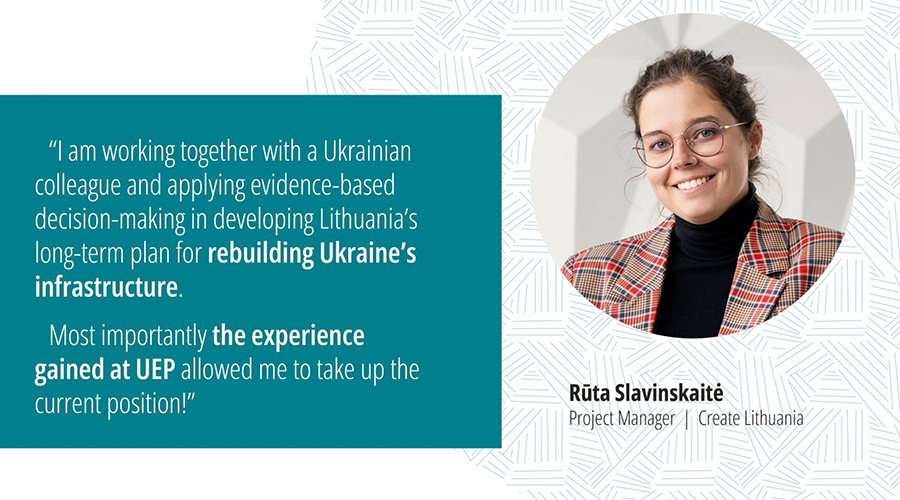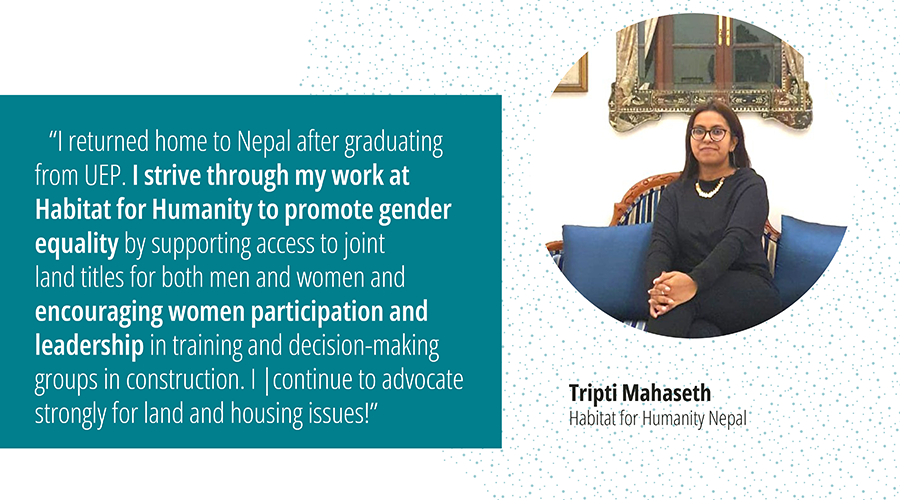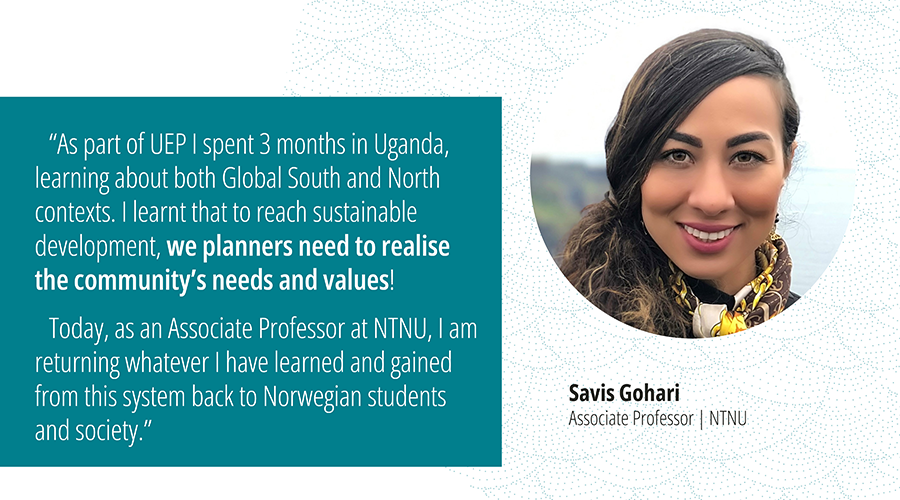Career opportunities - Urban Ecological Planning (Master's Programme)
Career opportunities
Our past students have been successfully employed in various professions both in Norway and around the world. Some have developed successful careers as academics and as development professionals in both non-government organisations and the public sector. Others are active in the private sector as urban planning consultants, area planners, spatial planners, transport planners/researchers, architects, and landscape architects. Some UEP alumni have also been employed as consultants at different United Nations and European Union agencies and other multilateral institutions.
Our alumni
Rūta Slavinskaitė
Project Manager at Create Lithuania
Developing a long-term plan for rebuilding Ukraine’s infrastructure

Read more about Ruta’s work and her experience with UEP
Read more about Ruta’s work and her experience with UEP
Studying at UEP I had great teachers and classmates from around the world who included their extensive experiences in the learning processes making it a palette of global context. I participated in fieldwork in India, enrolled in a summer school and internship in the US and did an exchange semester in Peru. Norway’s educational system provided me with these opportunities that would not have been possible back home.
Since 2020 I have worked both in the public and private sectors in Lithuania - at the Vilnius city municipality as an architect working on the city masterplan, developing street design guidelines that are actively used to make the city streets more inclusive and now as project manager at Create Lithuania. I am working together with a Ukrainian colleague and applying evidence-based decision making in developing Lithuania’s long-term plan for rebuilding Ukraine's infrastructure.
Hamish Hay
Water Engineer at Frank Water
Ensuring fair distribution of water resources in vulnerable communities in India
Tripti Mahaseth
Advocacy Research Manager for Habitat for Humanity Asia-Pacific Office
Advocating for gender equality in housing allocations in Nepal

Read more about Tripti's work and her experience with UEP
Read more about Tripti's work and her experience with UEP
The key issue at the time of my study was the refugee crisis and integration of refugees to the Norwegian society. I returned to Nepal to continue my effort to include people in the creation of places through community-based participatory techniques in my work at Habitat for Humanity Nepal. I strive through my work to promote gender equality by supporting access to joint land titles to both men and women and encouraging women participation and leadership in trainings and decision-making groups in construction.
I have had the pleasure to receive a letter of appreciation from the Prime Minister of Nepal as the lead of the environmentally friendly bamboo housing project in Eastern Nepal! I continue to advocate strongly for land and housing issues through coordination with line ministries, publications in national level newspapers and presentations at platforms such as the Asia Shelter Forum.
Laura Flóra Podoski
Project leader at Boligstiftelsen i Trondheim (Trondheim housing foundation)
Working on affordable and accessible housing for all
(Video in Norwegian)
Savis Gohari
Associate Professor at NTNU
Teaching the principles of Urban Ecological Planning to the next generation

Read more about Savari's work and her experience with UEP
Read more about Savari's work and her experience with UEP
The UEP program has provided me with fundamental knowledge about the real urban challenges of both global North and South. The biggest lesson I learnt was to reach sustainable development, we planners need to realize the community’s needs and values. In addition, we need to see the great power and impact of self-discovery, self-awareness, self-expression, and self-reflection if we really want to change the lives of others. “If you want to change the world – Start with yourself.”
Since I graduated from UEP in 2013, I have been a part of the Department of Architecture and Design; first as a PhD candidate on “sustainable urban planning in a framework of network Governance” and today, as a researcher on “Smart Sustainable Cities”. Today, as an Associate Professor at NTNU, I am returning whatever I have learned and gained from this system back to Norwegian students and society.
Further research opportunities
The UEP team also supervises doctoral and post-doctoral research. The PhD research is a structured degree with a nominal duration of three-year full-time study. Some PhD positions may include a fourth year of required duties, usually in the form of teaching.
- The programme consists of at least 30 ECTS of coursework, and an independent academic work in the form of a doctoral thesis estimated to 2.5 years.
- A PhD degree requires a great deal of independence and capacity for completion.
- The final thesis should contribute to the development of new scientific knowledge and meet international standards in the field.
- PhD education at NTNU is internationally oriented.
- You are expected to contribute to international conferences and publish in international peer-reviewed journals.
- It is possible to complete part of your studies abroad, either in the form of a prolonged research stay or by completing some of your courses abroad.
In addition to a master's degree or equivalent and a strong academic record, financing is an absolute requirement for admission to a PhD programme. Funding can be both through NTNU and other sources. Available PhD positions at NTNU are continuously posted online.
Read more about the PhD programme at the Faculty of Architecture and Design (AD)
NTNU also offers the possibility to conduct practice-based research in the fields of architecture and urban design.
Read more about Practice based PhDs at the AD faculty (PDF)
